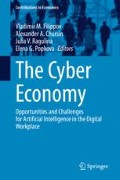Abstract
Purpose: The purpose of this chapter is to provide a critical analysis of the initial results of digital modernization in the modern economy based on the breakthrough technologies of Industry 4.0. The chapter also introduces the concept of the ‘Cyber Economy’ as a new type of economic system. The chapter illustrates that the cyber economy is a product of digital modernization, provides a definition of the cyber economy and also scientifically substantiates the logic and sequence of the birth of the cyber economy.
Design/methodology/approach: Because the expected result of any country’s modernization is to enhance the livelihoods of its citizens, an assessment of the effect of the level of an economy’s digital competitiveness on the population’s living standards was conducted. The assessment was done with the help of regression analysis using statistical data from the IMD World Competitiveness Center and Numbeo. The research was conducted on countries with the highest level of digital competitiveness in 2018, including Russia. The rationale behind the selection of countries was that they are the only ones where there is a statistically significant influence of digital modernization on the population’s living standards.
Findings: As a result of studying the peculiarities of various technological modes, the stages of digital modernization for the economy based on the breakthrough technologies of Industry 4.0 were characterized as follows: the information economy, the digital economy, and, ultimately, the cyber economy. A conceptual model of the cyber economy was built reflecting its technological mode, objectives and means of management, criterion for measuring the effectiveness of management, new subjects of economic relations, and new spheres of the economy.
Originality/value: It is substantiated that the digital modernization of the economy based on the breakthrough technologies of Industry 4.0 will lead to the formation of the cyber economy that will involve the close interaction of humans and fully autonomous machines within cyber-physical systems that are transparent, predictable, and manageable.
Access this chapter
Tax calculation will be finalised at checkout
Purchases are for personal use only
References
Bogoviz AV (2019) Industry 4.0 as a new vector of growth and development of knowledge economy. Stud Syst Decis Control 169:85–91
Cho S, Park C, Kim J (2019) Leveraging consumption intention with identity information on sharing economy platforms. J Comput Inf Syst 59(2):178–187
Cottey A (2018) Economic language and economy change: with implications for cyber-physical systems. AI Soc 33(3):323–333
Crittenden VL, Crittenden WF, Ajjan H (2019) Empowering women micro-entrepreneurs in emerging economies: the role of information communications technology. J Bus Res 98:191–203
Dutta A, McCrohan K (2002) Management’s role in information security in a the cyber economy. Calif Manag Rev 45(1):67–87
Federal Ministry of Germany for Economic Affairs and Energy, Federal Ministry of Germany of Education and Research (2019) Platform Industrie 4.0. https://www.plattform-i40.de/I40/Navigation/EN/Home/home.html. Accessed 23 Feb 2019
Government of the Russian Federation (2019) Program “Digital economy of the Russian Federation”, adopted by the Decree dated July 28, 2017, No. 1632-р. http://static.government.ru/media/files/9gFM4FHj4PsB79I5v7yLVuPgu4bvR7M0.pdf. Accessed 23 Feb 2019
IMD World Competitiveness Center (2019) World digital competitiveness ranking. https://www.imd.org/wcc/world-competitiveness-center-rankings/world-digital-competitiveness-rankings-2018/. Accessed 23 Feb 2019
Moinuddin S (2019) Digital political economy of India I. In: The political Twittersphere in India, Springer geography. Springer, Cham, pp 91–98
Mueller M, Grindal K (2019) Data flows and the digital economy: information as a mobile factor of production. Digit Policy Regul Gov 21(1):71–87
Numbeo (2019) Quality of life index. https://www.numbeo.com/quality-of-life/rankings_by_country.jsp. Accessed 23 Feb 2019
Popkova EG (2019) Preconditions of formation and development of Industry 4.0 in the conditions of knowledge economy. Stud Syst Decis Control 169:65–72
Popkova EG, Ragulina YV, Bogoviz AV (2019) Fundamental differences of transition to Industry 4.0 from previous industrial revolutions. Stud Syst Decis Control 169:21–29
Rohret D, Vella M (2018) Crypto currency: expanding the underground the cyber economy. In: Proceedings of the 13th international conference on cyber warfare and security, ICCWS 2018, March 2018, pp 645–650
Saiz-Álvarez J-M (2011) Social market economy and welfare state towards the formation of a new cybereconomy. In: International political economy. Nova Science Publishers, Hauppauge, NY, pp 219–232
Sanjuán CE, Cárdenas Garciá M, De Cañizares Arévalo J (2018) Architecture of a digital economy policy: a tool to achieve efficiency in the development of the local economy. J Phys Conf Ser 1126(1):012064
Teoh CS, Mahmood AK (2017) National cyber security strategies for digital economy. J Theor Appl Inf Technol 95(23):6510–6522
Walker S (2012) Economics and the cyber challenge. Inf Secur Tech Rep 17(1–2):9–18
Zaytsev AG, Plakhova LV, Legostaeva SA, Zakharkina NV, Zviagintceva YA (2019) Establishment of information economy under the influence of scientific and technical progress: new challenges and possibilities. Adv Int Syst Comput 726:3–10
Acknowledgments
The reported study was funded by RFBR according to the research project No. 18-010-00103 А.
Author information
Authors and Affiliations
Editor information
Editors and Affiliations
Rights and permissions
Copyright information
© 2019 Springer Nature Switzerland AG
About this chapter
Cite this chapter
Popkova, E.G., Haabazoka, L. (2019). The Cyber Economy as an Outcome of Digital Modernization Based on the Breakthrough Technologies of Industry 4.0. In: Filippov, V.M., Chursin, A.A., Ragulina, J.V., Popkova, E.G. (eds) The Cyber Economy. Contributions to Economics. Springer, Cham. https://doi.org/10.1007/978-3-030-31566-5_1
Download citation
DOI: https://doi.org/10.1007/978-3-030-31566-5_1
Published:
Publisher Name: Springer, Cham
Print ISBN: 978-3-030-31565-8
Online ISBN: 978-3-030-31566-5
eBook Packages: Economics and FinanceEconomics and Finance (R0)

